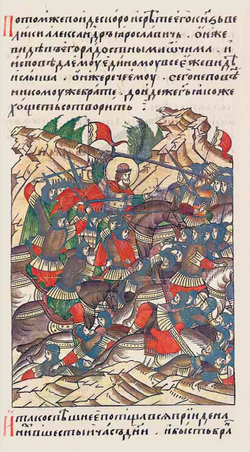| Battle of the Neva | |||||||
|---|---|---|---|---|---|---|---|
| Part of the Swedish–Novgorodian Wars | |||||||
 Depiction of the battle in the late 16th century illuminated manuscript of Ivan the Terrible | |||||||
| |||||||
| Belligerents | |||||||
| Commanders and leaders | |||||||
| Alexander Yaroslavich[a] |
Ulf Fase (arguably)[1] Spiridon † | ||||||
| Casualties and losses | |||||||
|
Novgorod First Chronicle: 20 killed |
Novgorod First Chronicle: "great number" | ||||||
The Battle of the Neva (Russian: Невская битва, romanized: Nevskaya bitva; Swedish: slaget vid Neva; Finnish: Nevan taistelu) was fought between the Novgorod Republic, along with Karelians, and the Kingdom of Sweden,[2] including Norwegian, Finnish and Tavastian forces, on the Neva River, near the settlement of Ust-Izhora, on 15 July 1240. The battle is mentioned only in Russian sources,[3] and it remains unclear whether it was a major invasion or a small-scale raid.[4][5] In Russian historiography, it has become an event of massive scale and importance.[6]
Cite error: There are <ref group=lower-alpha> tags or {{efn}} templates on this page, but the references will not show without a {{reflist|group=lower-alpha}} template or {{notelist}} template (see the help page).
- ^ Shaskolsky I. P. Борьба Руси против крестоносной агрессии на берегах Балтики в XII–XIII вв. Science, 1978. p. 178
- ^ Murray, Alan V. (2017). Crusade and Conversion on the Baltic Frontier 1150–1500. Taylor & Francis. p. 143. ISBN 978-1-351-94715-2.
- ^ Cite error: The named reference
Philipwas invoked but never defined (see the help page). - ^ Lind, John H. (1991). "Early Russian-Swedish Rivalry: The battle on the Neva in 1240 and Birger Magnussons' second crusade to Tavastia". Scandinavian Journal of History. 16 (4): 269, 278. doi:10.1080/03468759108579222. ISSN 0346-8755. Retrieved 18 July 2022.
Initially perhaps no more than a raid, maybe on an even lesser scale than the raid in 1164 on Ladoga, described in some detail in the Novgorod chronicles, it had by ca. 1330 grown...
- ^ Carleton, Gregory (2017). Russia: The Story of War. Harvard University Press. p. 19. ISBN 9780674972483.
For Western scholars, the number and intent of the attacking Swedes and Teutonic knights remain in contention: large raiding parties or full-fledged invasions? That, for example, there is no record in Swedish chronicles of the battle at the Neva River might suggest its scale was smaller than the honorific title the prince claimed from it.
- ^ Lind, John H. (1991). "Early Russian-Swedish Rivalry: The battle on the Neva in 1240 and Birger Magnussons' second crusade to Tavastia". Scandinavian Journal of History. 16 (4): 269. doi:10.1080/03468759108579222. ISSN 0346-8755. Retrieved 18 July 2022.
In Russian historiography and tradition the battle has become an event of immense proportions and significance.